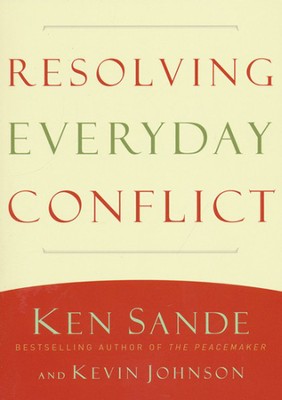In a previous post, I wrote about the need for having boundaries, or "building walls," in order to protect yourself in relationships.
Not walls that prevent good communication, but boundaries that keep communication flowing in a healthy way. Sort of like speed bumps, so you don't get run over by those who like to control things.
Sometimes, I avoid dealing with boundaries because I don't like conflict. Instead of doing something about the issues, I just pretend they don't bother me.
Part of the reason I have done this is because I (consciously or unconsciously) believe that it is important not to have strife. Because Christians aren't supposed to argue, right? You know, blessed are the peacemakers?
Ken Sande talks about this very thing in his book, "Resolving Everyday Conflict."
Conversely, I have stomped into a situation and all over the other person, determined to be
heard and for her to know how very, very wrong she was for what she did or
said to me. The author calls that peace-breaking.
The word peace has two definitions:
When Jesus promises us peace that surpasses all comprehension (Philippians 4:7), I do not believe He meant that our lives will be filled with Pollyanna perfection and no feathers would ever be ruffled.
Can we fully exercise our faith in God and apply the principles in the Bible, if our lives are free from disturbance, always tranquil? Who needs faith to live that way? It's a piece of cake.
Rather, I believe the second definition is what he promises us, from an internal perspective. He will give us a peace that keeps us from feeling undone in the face of trouble.
Jesus gives us a ridiculous, no-one-can-understand-it peace that makes people puzzled when we are calm in the midst of the storms of life. And it only comes by the power of God. We cannot conjure it up. We cannot fake it.
As Ken Sande points out,"Our problem isn't knowing the right thing to do, but having the power to do it. (pg 25). He goes on to say:
What about you? How do you handle conflict? Do you struggle with being a peace-faker, or a peace-breaker?
Linking with others for
Not walls that prevent good communication, but boundaries that keep communication flowing in a healthy way. Sort of like speed bumps, so you don't get run over by those who like to control things.
Sometimes, I avoid dealing with boundaries because I don't like conflict. Instead of doing something about the issues, I just pretend they don't bother me.
Part of the reason I have done this is because I (consciously or unconsciously) believe that it is important not to have strife. Because Christians aren't supposed to argue, right? You know, blessed are the peacemakers?
Ken Sande talks about this very thing in his book, "Resolving Everyday Conflict."
The author says avoiding strife, for the sake of avoiding it, isn't peacemaking, it's peace-faking.
That struck a nerve with me because I have kept quiet and feigned indifference or
blew off the notion that I was hurt or offended—even though I was—simply
because I didn't want the stress of an inevitable argument.
The word peace has two definitions:
- freedom from disturbance; quiet and tranquility.
- freedom from or the cessation of war or violence.
When Jesus promises us peace that surpasses all comprehension (Philippians 4:7), I do not believe He meant that our lives will be filled with Pollyanna perfection and no feathers would ever be ruffled.
Can we fully exercise our faith in God and apply the principles in the Bible, if our lives are free from disturbance, always tranquil? Who needs faith to live that way? It's a piece of cake.
Rather, I believe the second definition is what he promises us, from an internal perspective. He will give us a peace that keeps us from feeling undone in the face of trouble.
Jesus gives us a ridiculous, no-one-can-understand-it peace that makes people puzzled when we are calm in the midst of the storms of life. And it only comes by the power of God. We cannot conjure it up. We cannot fake it.
As Ken Sande points out,"Our problem isn't knowing the right thing to do, but having the power to do it. (pg 25). He goes on to say:
After all, Jesus Himself said:
"If we forget the gospel is for now—for sins we struggle with today, for areas where we still want to grow, for relationships that are broken—then we miss the rich treasure that belongs to us in Christ...Through the gospel we enter a journey to become more like Christ. The Lord continually works in our lives to change us into his image. Among other things, he constantly works in us to change how we deal with conflict."
"By this all men will know that you are My disciples, if you have love for one another," (John 13:35 NASB).
Linking with others for


Comments
Post a Comment
Thanks for stopping by! I would love to hear from you...